丘吉尔演讲稿永不放弃原文
- 格式:docx
- 大小:11.22 KB
- 文档页数:1

编号:丘吉尔演讲稿永不放弃_世间难得丘吉尔甲方:乙方:签订日期:年月日X X公司领袖的特质之一,就是情商要够高,抵得住如山压力,在关键时刻,沉着应变,敢于决断。
1940年5月,纳粹的铁蹄踏遍整个欧洲,大不列颠举国上下弥漫着一片战败的阴影。
5月10日,就在这英国近代史上最灰暗的一刻,丘吉尔就任首相,战争重担一下子通通压到了他的肩膀上。
丘吉尔如此形容那一刻的感受:“上床时已经是凌晨3时了,我反而深有一种如释重负的感觉。
最终,我对当前的整个形势有掌舵的权力了。
我感觉到自己正与天命同行。
我的前半生、活着的每一天,都是为如今这一刻、这一步在做着准备……我想我完全掌握着这一切,我可以肯定,我不会让自己失败。
”丘吉尔是天生的领袖,斗志昂扬地去迎接重大责任,并相信自己为此而生。
但大多数人没有这种天赋。
艾森豪威尔曾引拿破仑一句话来为“领导力”下注脚:“领导力就是当你身边的人忙得发疯或歇斯底里时,你仍然能沉着、正常地工作。
”1944年6月6日,盟军登陆诺曼底。
这是史上最大规模的登陆战,上百万盟军子弟兵跨越茫茫大海,被送到敌人正在磨刀霍霍、严阵以待的“大西洋长城”。
他们的生与死、光荣抑或毁灭,都在个别人的一念之间。
整个作战中最关键的是天气,由于进攻时机要准确配合风雨、月光、潮汐甚至日出时间等因素,盟军发现6月只有5、6、7日3天较为适合。
艾森豪威尔事后说:“如果这3天的天气都不理想,随之而来的后果将不堪设想,我们将失去隐秘性……”到了6月4日,天气非常恶劣,云层很低,风浪很大,越来越多迹象显示行动将十分危险,甚至功败垂成。
艾森豪威尔的幕僚长史密斯将军事后形容,他脸上“挂着因沉重的决策压力产生的严肃表情”。
次日,气候专家带来一线好消息,他的下属开始围着专家连珠“发炮”,当问题问完后,会议室持续出现了5分钟的可怕沉默,大家把目光投向艾帅。
终于,艾森豪威尔抬起头来,露出刚毅、决断的表情,明快地说:“好吧,我们上!”决策既下,大军出发,一切已成定局之后,艾森豪威尔变得无事可做,在沉重的压力下,你猜他以什么方法来减压?他独自在一个角落默默祈祷,把一切都交托给上帝。
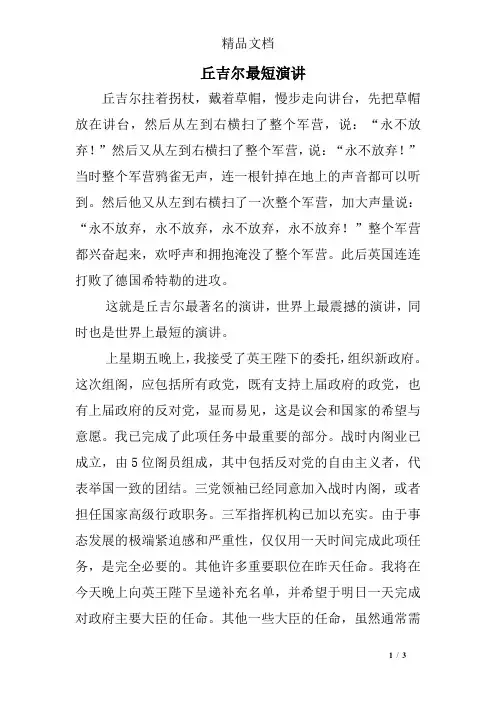
丘吉尔最短演讲丘吉尔拄着拐杖,戴着草帽,慢步走向讲台,先把草帽放在讲台,然后从左到右横扫了整个军营,说:“永不放弃!”然后又从左到右横扫了整个军营,说:“永不放弃!”当时整个军营鸦雀无声,连一根针掉在地上的声音都可以听到。
然后他又从左到右横扫了一次整个军营,加大声量说:“永不放弃,永不放弃,永不放弃,永不放弃!”整个军营都兴奋起来,欢呼声和拥抱淹没了整个军营。
此后英国连连打败了德国希特勒的进攻。
这就是丘吉尔最著名的演讲,世界上最震撼的演讲,同时也是世界上最短的演讲。
上星期五晚上,我接受了英王陛下的委托,组织新政府。
这次组阁,应包括所有政党,既有支持上届政府的政党,也有上届政府的反对党,显而易见,这是议会和国家的希望与意愿。
我已完成了此项任务中最重要的部分。
战时内阁业已成立,由5位阁员组成,其中包括反对党的自由主义者,代表举国一致的团结。
三党领袖已经同意加入战时内阁,或者担任国家高级行政职务。
三军指挥机构已加以充实。
由于事态发展的极端紧迫感和严重性,仅仅用一天时间完成此项任务,是完全必要的。
其他许多重要职位在昨天任命。
我将在今天晚上向英王陛下呈递补充名单,并希望于明日一天完成对政府主要大臣的任命。
其他一些大臣的任命,虽然通常需要更多一点的时间,但是,我相信会议再次开会时,我的这项任务将告完成,而且本届政府在各方面都将是完整无缺的。
我认为,向下院建议在今天开会是符合公众利益。
议长先生同意这个建议,并根据下院决议所授予他的权力,采取了必要的步骤。
今天议程结束时,建议下院休会到5月21日星期二。
当然,还要附加规定,如果需要的话,可以提前复会。
下周会议所要考虑的议题,将尽早通知全体议员。
现在,我请求下院,根据以我的名义提出的决议案,批准已采取的各项步骤,将它记录在案,并宣布对新政府的信任。
组成一届具有这种规模和复杂性的政府,本身就是项严肃的任务。
但是大家一定要记住,我们正处在历史上一次最伟大的战争的初期阶段,我们正在挪威和荷兰的许多地方进行战斗,我们必须在地中海地区做好准备,空战仍在继续,众多的战备工作必须在国内完成。
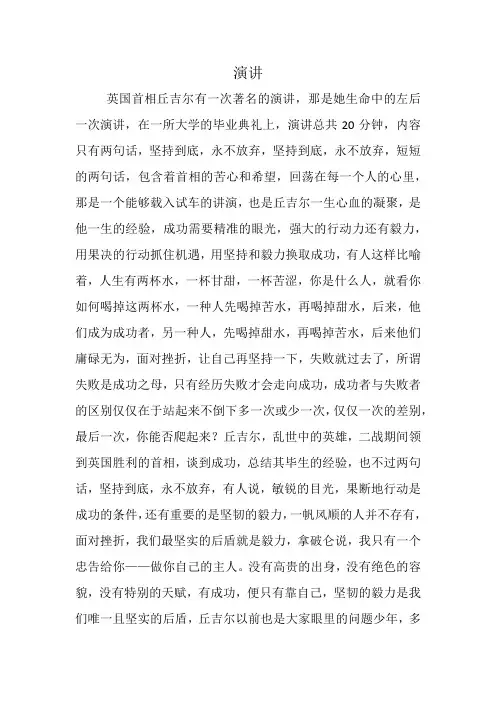
演讲英国首相丘吉尔有一次著名的演讲,那是她生命中的左后一次演讲,在一所大学的毕业典礼上,演讲总共20分钟,内容只有两句话,坚持到底,永不放弃,坚持到底,永不放弃,短短的两句话,包含着首相的苦心和希望,回荡在每一个人的心里,那是一个能够载入试车的讲演,也是丘吉尔一生心血的凝聚,是他一生的经验,成功需要精准的眼光,强大的行动力还有毅力,用果决的行动抓住机遇,用坚持和毅力换取成功,有人这样比喻着,人生有两杯水,一杯甘甜,一杯苦涩,你是什么人,就看你如何喝掉这两杯水,一种人先喝掉苦水,再喝掉甜水,后来,他们成为成功者,另一种人,先喝掉甜水,再喝掉苦水,后来他们庸碌无为,面对挫折,让自己再坚持一下,失败就过去了,所谓失败是成功之母,只有经历失败才会走向成功,成功者与失败者的区别仅仅在于站起来不倒下多一次或少一次,仅仅一次的差别,最后一次,你能否爬起来?丘吉尔,乱世中的英雄,二战期间领到英国胜利的首相,谈到成功,总结其毕生的经验,也不过两句话,坚持到底,永不放弃,有人说,敏锐的目光,果断地行动是成功的条件,还有重要的是坚韧的毅力,一帆风顺的人并不存有,面对挫折,我们最坚实的后盾就是毅力,拿破仑说,我只有一个忠告给你——做你自己的主人。
没有高贵的出身,没有绝色的容貌,没有特别的天赋,有成功,便只有靠自己,坚韧的毅力是我们唯一且坚实的后盾,丘吉尔以前也是大家眼里的问题少年,多少年成绩不佳,甚至还经常遭到老师的体罚,他没有被打垮,反而奋起,终于,在持续拼搏中的丘吉尔步入政坛,直到坐上首相这把交椅。
人生小哲理,每个人都是自己的主人,毅力是我们坚强的后盾,世界上没有失败的人,只有尚未成功的人,成功无他,坚持而已,很多时候,我们被迫放弃在成功面前,却在事实面前追悔莫及,仅仅最后一点点的坚持,决定了一个人的成败,莫要被自己的心里吓退,莫要档成功近在咫尺时倒下,在努力一点,再坚持一下,梦想会变成现实。
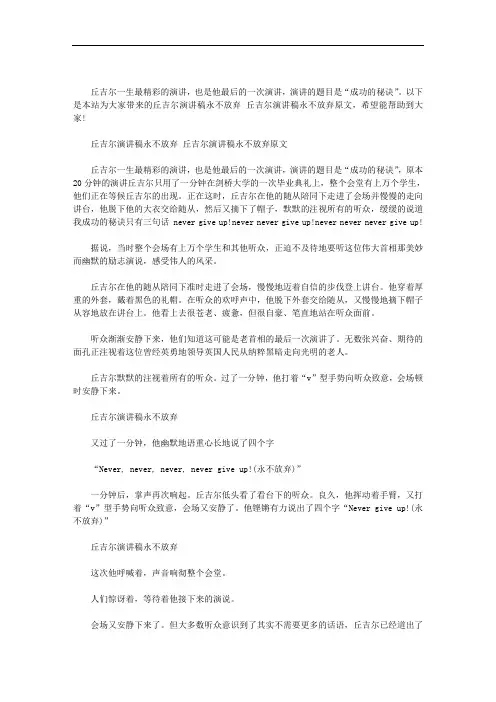
丘吉尔一生最精彩的演讲,也是他最后的一次演讲,演讲的题目是“成功的秘诀”。
以下是本站为大家带来的丘吉尔演讲稿永不放弃丘吉尔演讲稿永不放弃原文,希望能帮助到大家!丘吉尔演讲稿永不放弃丘吉尔演讲稿永不放弃原文丘吉尔一生最精彩的演讲,也是他最后的一次演讲,演讲的题目是“成功的秘诀”,原本20分钟的演讲丘吉尔只用了一分钟在剑桥大学的一次毕业典礼上,整个会堂有上万个学生,他们正在等候丘吉尔的出现。
正在这时,丘吉尔在他的随从陪同下走进了会场并慢慢的走向讲台,他脱下他的大衣交给随从,然后又摘下了帽子,默默的注视所有的听众,缓缓的说道我成功的秘诀只有三句话 never give up!never never give up!never never never give up!据说,当时整个会场有上万个学生和其他听众,正迫不及待地要听这位伟大首相那美妙而幽默的励志演说,感受伟人的风采。
丘吉尔在他的随从陪同下准时走进了会场,慢慢地迈着自信的步伐登上讲台。
他穿着厚重的外套,戴着黑色的礼帽。
在听众的欢呼声中,他脱下外套交给随从,又慢慢地摘下帽子从容地放在讲台上。
他看上去很苍老、疲惫,但很自豪、笔直地站在听众面前。
听众渐渐安静下来,他们知道这可能是老首相的最后一次演讲了。
无数张兴奋、期待的面孔正注视着这位曾经英勇地领导英国人民从纳粹黑暗走向光明的老人。
丘吉尔默默的注视着所有的听众。
过了一分钟,他打着“v”型手势向听众致意,会场顿时安静下来。
丘吉尔演讲稿永不放弃又过了一分钟,他幽默地语重心长地说了四个字“Never, never, never, never give up!(永不放弃)”一分钟后,掌声再次响起。
丘吉尔低头看了看台下的听众。
良久,他挥动着手臂,又打着“v”型手势向听众致意,会场又安静了。
他铿锵有力说出了四个字“Never give up!(永不放弃)”丘吉尔演讲稿永不放弃这次他呼喊着,声音响彻整个会堂。
人们惊讶着,等待着他接下来的演说。

【演讲稿模板】丘吉尔演讲永不放弃编写人:XXX日期:XXXWord A4打印标准格式可随意修改丘吉尔演讲永不放弃篇一:丘吉尔英语演讲稿:就职演说(中英对照)1940年5月8日,由于前首相张伯伦遭到不信任质疑动议,被迫辞职。
5月10日下午6时,国王召见丘吉尔,令其组阁;一小时后丘吉尔会见工党领袖艾德礼,邀请工党加入内阁并获得支持。
3天后丘吉尔首次以首相身份出席下议院会议,发表了著名的讲话:“我没有别的,只有热血、辛劳、眼泪和汗水献给大家……你们问:我们的目的是什么?我可以用一个词来答复:胜利,不惜一切代价去争取胜利,无论多么恐怖也要争取胜利,无论道路多么遥远艰难,也要争取胜利,因为没有胜利就无法生存。
”下议院最终以381票对0票的绝对优势表明了对丘吉尔政府的支持。
正文:On Friday evening last I received from His Majesty the mission to form a new administration.上星期五晚上,我奉陛下之命,组织新的一届政府。
It was the evident will of Parliament and the nation that this should be conceived on the broadest possible basis and that it should include all parties.按国会和国民的意愿,新政府显然应该考虑建立在尽可能广泛的基础上,应该兼容所有的党派。
I have already completed the most important part of this task. A war cabinet has been formed of five members, representing, with the Labor, Opposition and Liberals, the unity of the nation.我已经完成了这项任务的最主要的部分。
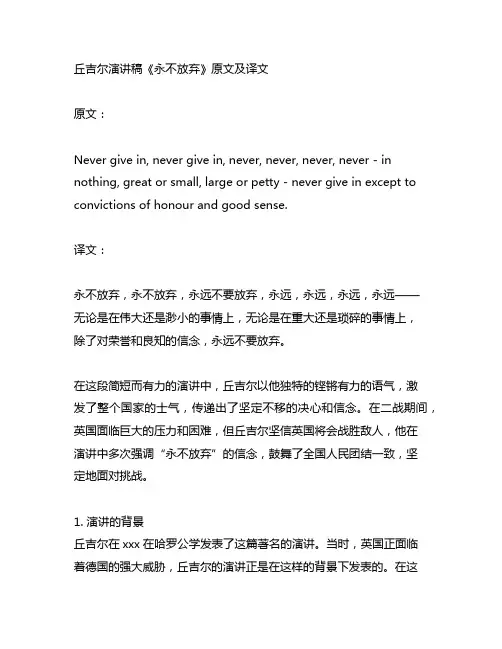
丘吉尔演讲稿《永不放弃》原文及译文原文:Never give in, never give in, never, never, never, never - in nothing, great or small, large or petty - never give in except to convictions of honour and good sense.译文:永不放弃,永不放弃,永远不要放弃,永远,永远,永远,永远——无论是在伟大还是渺小的事情上,无论是在重大还是琐碎的事情上,除了对荣誉和良知的信念,永远不要放弃。
在这段简短而有力的演讲中,丘吉尔以他独特的铿锵有力的语气,激发了整个国家的士气,传递出了坚定不移的决心和信念。
在二战期间,英国面临巨大的压力和困难,但丘吉尔坚信英国将会战胜敌人,他在演讲中多次强调“永不放弃”的信念,鼓舞了全国人民团结一致,坚定地面对挑战。
1. 演讲的背景丘吉尔在xxx在哈罗公学发表了这篇著名的演讲。
当时,英国正面临着德国的强大威胁,丘吉尔的演讲正是在这样的背景下发表的。
在这场战争中,英国陷入了前所未有的困境,但丘吉尔仍然保持着乐观的态度,他相信英国的胜利是必然的。
他希望通过自己的演讲激励全国人民,坚定对抗德国的信心,让他们知道只要坚持不懈,永不放弃,最终胜利一定会属于他们。
2. 演讲的分析丘吉尔在这个演讲中反复强调“永不放弃”,这不仅仅是一句口号,而是一种坚定的决心和信念。
在面对巨大的压力和困难时,人们往往容易产生动摇和退缩,但丘吉尔告诫人们,无论面对何种困难,都要坚持下去,永不退缩。
他认为只要有荣誉和良知的信念支撑,就一定能够克服一切困难,取得最终的胜利。
3. 演讲的影响丘吉尔的这个演讲产生了深远的影响,不仅激励了当时的英国人民,也成为了后人学习和借鉴的典范。
他的坚定决心和信念为英国人民注入了持续战斗下去的勇气和力量,使英国最终战胜了德国,赢得了二战的胜利。

编号:丘吉尔演讲稿永不放弃_世间难得丘吉尔甲方:乙方:签订日期:年月日X X公司领袖的特质之一,就是情商要够高,抵得住如山压力,在关键时刻,沉着应变,敢于决断。
1940年5月,纳粹的铁蹄踏遍整个欧洲,大不列颠举国上下弥漫着一片战败的阴影。
5月10日,就在这英国近代史上最灰暗的一刻,丘吉尔就任首相,战争重担一下子通通压到了他的肩膀上。
丘吉尔如此形容那一刻的感受:“上床时已经是凌晨3时了,我反而深有一种如释重负的感觉。
最终,我对当前的整个形势有掌舵的权力了。
我感觉到自己正与天命同行。
我的前半生、活着的每一天,都是为如今这一刻、这一步在做着准备……我想我完全掌握着这一切,我可以肯定,我不会让自己失败。
”丘吉尔是天生的领袖,斗志昂扬地去迎接重大责任,并相信自己为此而生。
但大多数人没有这种天赋。
艾森豪威尔曾引拿破仑一句话来为“领导力”下注脚:“领导力就是当你身边的人忙得发疯或歇斯底里时,你仍然能沉着、正常地工作。
”1944年6月6日,盟军登陆诺曼底。
这是史上最大规模的登陆战,上百万盟军子弟兵跨越茫茫大海,被送到敌人正在磨刀霍霍、严阵以待的“大西洋长城”。
他们的生与死、光荣抑或毁灭,都在个别人的一念之间。
整个作战中最关键的是天气,由于进攻时机要准确配合风雨、月光、潮汐甚至日出时间等因素,盟军发现6月只有5、6、7日3天较为适合。
艾森豪威尔事后说:“如果这3天的天气都不理想,随之而来的后果将不堪设想,我们将失去隐秘性……”到了6月4日,天气非常恶劣,云层很低,风浪很大,越来越多迹象显示行动将十分危险,甚至功败垂成。
艾森豪威尔的幕僚长史密斯将军事后形容,他脸上“挂着因沉重的决策压力产生的严肃表情”。
次日,气候专家带来一线好消息,他的下属开始围着专家连珠“发炮”,当问题问完后,会议室持续出现了5分钟的可怕沉默,大家把目光投向艾帅。
终于,艾森豪威尔抬起头来,露出刚毅、决断的表情,明快地说:“好吧,我们上!”决策既下,大军出发,一切已成定局之后,艾森豪威尔变得无事可做,在沉重的压力下,你猜他以什么方法来减压?他独自在一个角落默默祈祷,把一切都交托给上帝。
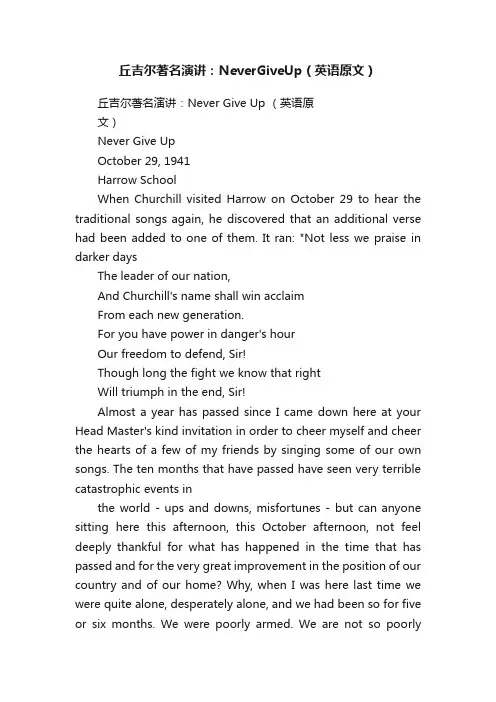
丘吉尔著名演讲:NeverGiveUp(英语原文)丘吉尔著名演讲:Never Give Up (英语原文)Never Give UpOctober 29, 1941Harrow SchoolWhen Churchill visited Harrow on October 29 to hear the traditional songs again, he discovered that an additional verse had been added to one of them. It ran: "Not less we praise in darker daysThe leader of our nation,And Churchill's name shall win acclaimFrom each new generation.For you have power in danger's hourOur freedom to defend, Sir!Though long the fight we know that rightWill triumph in the end, Sir!Almost a year has passed since I came down here at your Head Master's kind invitation in order to cheer myself and cheer the hearts of a few of my friends by singing some of our own songs. The ten months that have passed have seen very terrible catastrophic events inthe world - ups and downs, misfortunes - but can anyone sitting here this afternoon, this October afternoon, not feel deeply thankful for what has happened in the time that has passed and for the very great improvement in the position of our country and of our home? Why, when I was here last time we were quite alone, desperately alone, and we had been so for five or six months. We were poorly armed. We are not so poorlyarmed today; but then we were very poorly armed. We had the unmeasured menace of the enemy and their air attack still beating upon us, and you yourselves had had experience of this attack; and I expect you are beginning to feel impatient that there has been this long lull with nothing particular turning up!But we must learn to be equally good at what is short and sharp and what is long and tough. It is generally said that the British are often better at the last. They do not expect to move from crisis to crisis; they do not always expect that each day will bring up some noble chance of war; but when they very slowly make up their minds that the thing has to be done and the job put through and finished, then, even if it takes months - if it takes years - they do it.Another lesson I think we may take, just throwing our minds back to our meeting here ten months ago and now, is that appearances are often very deceptive, and as Kipling well says, we must "…meet with Triumph and Disaster. And treat those two impostors just the same."You cannot tell from appearances how things will go. Sometimes imagination makes things out far worse than they are; yet without imagination not much can be done. Those people who are imaginative see many more dangers than perhaps exist; certainly many more than will happen; but then they must also pray to be given that extra courage to carry this far-reaching imagination. But for everyone, surely, what we have gone through in this period - I am addressing myself to the School - surely from this period of ten months this is the lesson: never give in, never give in, never, never, never, never-in nothing, great or small, large or petty - never give in except to convictions of honour and good sense. Never yield to force; never yield to theapparently overwhelming might of the enemy. We stood all alone a year ago, and to many countries itseemed that our account was closed, we were finished. All this tradition of ours, our songs, our School history, this part of the history of this country, were gone and finished and liquidated.Very different is the mood today. Britain, other nations thought, had drawn a sponge across her slate. But instead our country stood in the gap. There was no flinching and no thought of giving in; and by what seemed almost a miracle to those outside these Islands, though we ourselves never doubted it, we now find ourselves in a position where I say that we can be sure that we have only to persevere to conquer.You sang here a verse of a School Song: you sang that extra verse written in my honour, which I was very greatly plimented by and which you have repeated today. But there is one word in it I want to alter - I wanted to do so last year, but I did not venture to. It is the line: "Not less we praise in darker days."I have obtained the Head Master's permission to alter darker to sterner. "Not less we praise in sterner days."Do not let us speak of darker days: let us speakrather of sterner days. These are not dark days; these are great days - the greatest days our country has ever lived; and we must all thank God that we have been allowed, each of us according to our stations, to play a part in making these days memorable in the history of our race.。
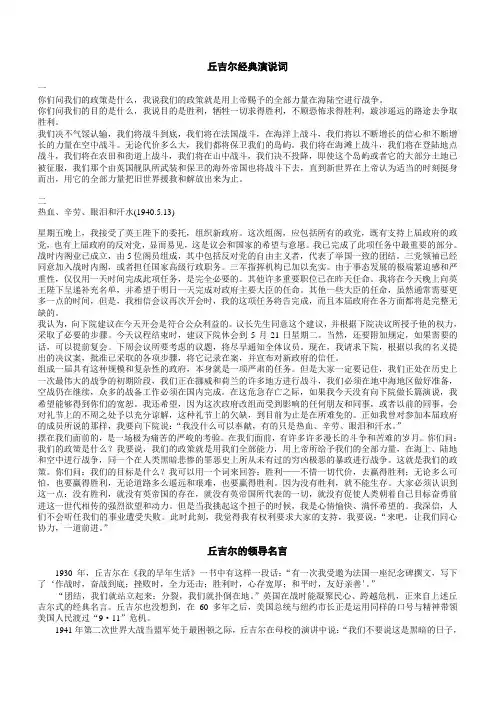
丘吉尔经典演说词一你们问我们的政策是什么,我说我们的政策就是用上帝赐予的全部力量在海陆空进行战争。
你们问我们的目的是什么,我说目的是胜利,牺牲一切求得胜利,不顾恐怖求得胜利,跋涉遥远的路途去争取胜利。
我们决不气馁认输,我们将战斗到底,我们将在法国战斗,在海洋上战斗,我们将以不断增长的信心和不断增长的力量在空中战斗。
无论代价多么大,我们都将保卫我们的岛屿。
我们将在海滩上战斗,我们将在登陆地点战斗,我们将在农田和街道上战斗,我们将在山中战斗,我们决不投降,即使这个岛屿或者它的大部分土地已被征服,我们那个由英国舰队所武装和保卫的海外帝国也将战斗下去,直到新世界在上帝认为适当的时刻挺身而出,用它的全部力量把旧世界援救和解放出来为止。
二热血、辛劳、眼泪和汗水(1940.5.13)星期五晚上,我接受了英王陛下的委托,组织新政府。
这次组阁,应包括所有的政党,既有支持上届政府的政党,也有上届政府的反对党,显而易见,这是议会和国家的希望与意愿。
我已完成了此项任务中最重要的部分。
战时内阁业已成立,由5位阁员组成,其中包括反对党的自由主义者,代表了举国一致的团结。
三党领袖已经同意加入战时内阁,或者担任国家高级行政职务。
三军指挥机构已加以充实。
由于事态发展的极端紧迫感和严重性,仅仅用一天时间完成此项任务,是完全必要的。
其他许多重要职位已在昨天任命。
我将在今天晚上向英王陛下呈递补充名单,并希望于明日一天完成对政府主要大臣的任命。
其他一些大臣的任命,虽然通常需要更多一点的时间,但是,我相信会议再次开会时,我的这项任务将告完成,而且本届政府在各方面都将是完整无缺的。
我认为,向下院建议在今天开会是符合公众利益的。
议长先生同意这个建议,并根据下院决议所授予他的权力,采取了必要的步骤。
今天议程结束时,建议下院休会到5月21日星期二。
当然,还要附加规定,如果需要的话,可以提前复会。
下周会议所要考虑的议题,将尽早通知全体议员。
现在,我请求下院,根据以我的名义提出的决议案,批准已采取的各项步骤,将它记录在案,并宣布对新政府的信任。
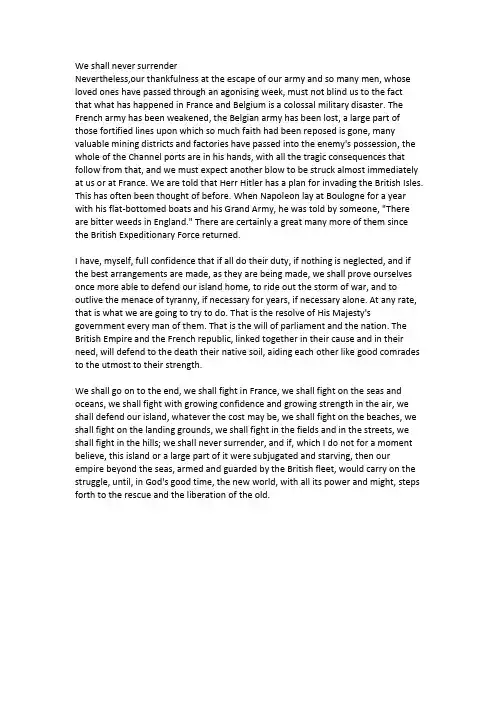
We shall never surrenderNevertheless,our thankfulness at the escape of our army and so many men, whose loved ones have passed through an agonising week, must not blind us to the fact that what has happened in France and Belgium is a colossal military disaster. The French army has been weakened, the Belgian army has been lost, a large part of those fortified lines upon which so much faith had been reposed is gone, many valuable mining districts and factories have passed into the enemy's possession, the whole of the Channel ports are in his hands, with all the tragic consequences that follow from that, and we must expect another blow to be struck almost immediately at us or at France. We are told that Herr Hitler has a plan for invading the British Isles. This has often been thought of before. When Napoleon lay at Boulogne for a year with his flat-bottomed boats and his Grand Army, he was told by someone, "There are bitter weeds in England." There are certainly a great many more of them since the British Expeditionary Force returned.I have, myself, full confidence that if all do their duty, if nothing is neglected, and if the best arrangements are made, as they are being made, we shall prove ourselves once more able to defend our island home, to ride out the storm of war, and to outlive the menace of tyranny, if necessary for years, if necessary alone. At any rate, that is what we are going to try to do. That is the resolve of His Majesty's government every man of them. That is the will of parliament and the nation. The British Empire and the French republic, linked together in their cause and in their need, will defend to the death their native soil, aiding each other like good comrades to the utmost to their strength.We shall go on to the end, we shall fight in France, we shall fight on the seas and oceans, we shall fight with growing confidence and growing strength in the air, we shall defend our island, whatever the cost may be, we shall fight on the beaches, we shall fight on the landing grounds, we shall fight in the fields and in the streets, we shall fight in the hills; we shall never surrender, and if, which I do not for a moment believe, this island or a large part of it were subjugated and starving, then our empire beyond the seas, armed and guarded by the British fleet, would carry on the struggle, until, in God's good time, the new world, with all its power and might, steps forth to the rescue and the liberation of the old.。
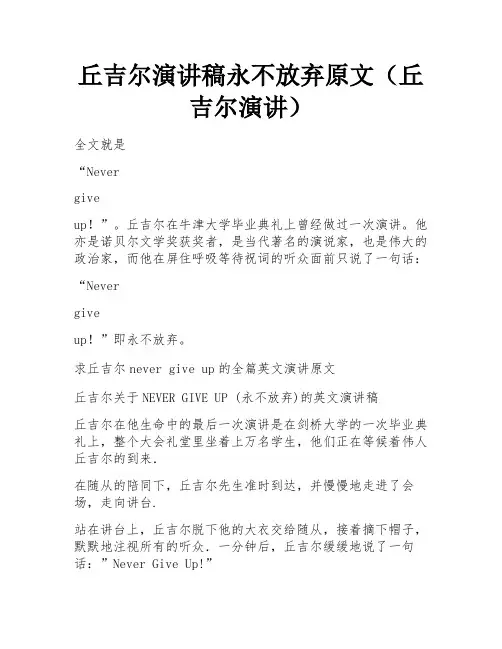
丘吉尔演讲稿永不放弃原文(丘吉尔演讲)全文就是“Nevergiveup!”。
丘吉尔在牛津大学毕业典礼上曾经做过一次演讲。
他亦是诺贝尔文学奖获奖者,是当代著名的演说家,也是伟大的政治家,而他在屏住呼吸等待祝词的听众面前只说了一句话:“Nevergiveup!”即永不放弃。
求丘吉尔never give up的全篇英文演讲原文丘吉尔关于NEVER GIVE UP (永不放弃)的英文演讲稿丘吉尔在他生命中的最后一次演讲是在剑桥大学的一次毕业典礼上,整个大会礼堂里坐着上万名学生,他们正在等候着伟人丘吉尔的到来.在随从的陪同下,丘吉尔先生准时到达,并慢慢地走进了会场,走向讲台.站在讲台上,丘吉尔脱下他的大衣交给随从,接着摘下帽子,默默地注视所有的听众.一分钟后,丘吉尔缓缓地说了一句话:”Never Give Up!”说完这句话后,丘吉尔穿上了大衣带上帽子离开了会场.整个会场鸦雀无声,一分钟后,掌声雷动,经久不息。
丘吉尔演讲稿丘吉尔是二战时期伟大的演说家,他的演说总是振奋人心。
下面是我为大家整理的丘吉尔演讲稿内容,供大家参考阅读。
篇一:丘吉尔演讲稿英国伟大首相丘吉尔先生最精彩的一次演讲,也是最后一次演讲,是在剑桥大学的一次毕业生典礼上。
当时整个会场坐着上万名学生,他们都在期待着伟人丘吉尔的到来。
在随从的陪伴下,令人尊重的丘吉尔先生准时到达会场,走向讲台。
站在讲台上,只见丘吉尔脱下大衣交给随从,然后摘下帽子,默默地注视现场的听众们,过了一分钟,他说了一句话:"Never give up !"(永不放弃)丘吉尔说完戴上帽子、穿上大衣离开了会场。
这让整个会场鸦雀无声,一分钟后,掌声雷动。
永不放弃,永不放弃,永不放弃!丘吉尔一生当中为英国和平立下汉马功劳,这些伟大的成就是丘吉尔坚持不懈努力取得的,是他"永不放弃"精神的最佳写照。
世界上另外一个最经典的关于"永不放弃"的例子,则是世界上最伟大的推销员乔.吉拉德的一场别开生面的演讲。
丘吉尔著名演讲:Never Give Up (英语原文)Never Give UpOctober 29, 1941Harrow SchoolWhen Churchill visited Harrow on October 29 to hear the traditional songs again, he discovered that an additional verse had been added to one of them. It ran: "Not less we praise in darker daysThe leader of our nation,And Churchill's name shall win acclaimFrom each new generation.For you have power in danger's hourOur freedom to defend, Sir!Though long the fight we know that rightWill triumph in the end, Sir!Almost a year has passed since I came down here at your Head Master's kind invitation in order to cheer myself and cheer the hearts of a few of my friends by singing some of our own songs. The ten months that have passed have seen very terrible catastrophic events inthe world - ups and downs, misfortunes - but can anyone sitting here this afternoon, this October afternoon, not feel deeply thankful for what has happened in the time that has passed and for the very great improvement in the position of our country and of our home? Why, when I was here last time we were quite alone, desperately alone, and we had been so for five or six months. We were poorly armed. We are not so poorly armed today; but then we were very poorly armed. We had the unmeasured menace of the enemy and their air attack still beating upon us, and you yourselves had had experience of this attack; and I expect you are beginning to feel impatient that there has been this long lull with nothing particular turning up!But we must learn to be equally good at what is short and sharp and what is long and tough. It is generally said that the British are often better at the last. They do not expect to move from crisis to crisis; they do not always expect that each day will bring up some noble chance of war; but when they very slowly make up their minds that the thing has to be done and the job put through and finished, then, even if it takes months -if it takes years - they do it.Another lesson I think we may take, just throwing our minds back to our meeting here ten months ago and now, is that appearances are often very deceptive, and as Kipling well says, we must "…meet with Triumph and Disaster. And treat those two impostors just the same."You cannot tell from appearances how things will go. Sometimes imagination makes things out far worse than they are; yet without imagination not much can be done. Those people who are imaginative see many more dangers than perhaps exist; certainly many more than will happen; but then they must also pray to be given that extra courage to carry this far-reaching imagination. But for everyone, surely, what we have gone through in this period - I am addressing myself to the School - surely from this period of ten months this is the lesson: never give in, never give in, never, never, never, never-in nothing, great or small, large or petty - never give in except to convictions of honour and good sense. Never yield to force; never yield to the apparently overwhelming might of the enemy. We stood all alone a year ago, and to many countries itseemed that our account was closed, we were finished. All this tradition of ours, our songs, our School history, this part of the history of this country, were gone and finished and liquidated.Very different is the mood today. Britain, other nations thought, had drawn a sponge across her slate. But instead our country stood in the gap. There was no flinching and no thought of giving in; and by what seemed almost a miracle to those outside these Islands, though we ourselves never doubted it, we now find ourselves in a position where I say that we can be sure that we have only to persevere to conquer.You sang here a verse of a School Song: you sang that extra verse written in my honour, which I was very greatly plimented by and which you have repeated today. But there is one word in it I want to alter - I wanted to do so last year, but I did not venture to. It is the line: "Not less we praise in darker days."I have obtained the Head Master's permission to alter darker to sterner. "Not less we praise in sterner days."Do not let us speak of darker days: let us speakrather of sterner days. These are not dark days; these are great days - the greatest days our country has ever lived; and we must all thank God that we have been allowed, each of us according to our stations, to play a part in making these days memorable in the history of our race.。
丘吉尔二战演讲(丘吉尔演讲名言永不言弃)查看全部1940年6月4日丘吉尔在下院通报了敦刻尔克撤退成功,但是也提醒'战争不是靠撤退打赢的。
'随后丘吉尔旋即发表了他在二战中最鼓舞人心的一段演说:丘吉尔二战演讲。
这次战役尽管我们失利,但我们决不投降,决不屈服,我们将战斗到底。
但是,在这次援救中却蕴藏着胜利,这一点应当注意到。
这个胜利是空军获得的。
这是英国和德国空军实力的一次重大考验。
德国空军的目的是要是我们从海滩撤退成为不可能,并且要击沉所有密集在那里数以千计的船只。
我对这些青年飞行员表示敬意。
强大的法国陆军当时在几千辆装甲车的冲击下大部分溃退了。
法兰西和比利时境内的战争,已成为千古憾事。
我们必须重建远征军,我们必须重建远征军,我们必须加强国防,必须减少国内的防卫兵力,增加海外的打击力量。
丘吉尔,英国政治家、演说家、军事家和作家,曾于1940年至1945年出任英国首相,任期内领导英国在第二次世界大战中联合美国等国家对抗德国,并取得了最终胜利,并自1951年至1955年再度出任英国首相。
丘吉尔被认为是20世纪最重要的政治领袖之一,对英国乃至于世界均影响深远。
此外,他在文学上也有很高的成就,曾于1953年获诺我们将战斗到底(演讲时间:1940年6月4日丘吉尔)1940年6月4日丘吉尔在下院通报了敦刻尔克撤退成功,但是也提醒“战争不是靠撤退打赢的。
”随后丘吉尔旋即发表了他在二战中最鼓舞人心的一段演说:这次战役尽管我们失利,但我们决不投降,决不屈服,我们将战斗到底。
我们必须非常慎重,不要把这次援救说成是胜利。
战争不是靠撤退赢得的。
但是,在这次援救中却蕴藏着胜利,这一点应当注意到。
这个胜利是空军获得的。
归来的许许多多士兵未曾见到过我们空军的行动,他们看到的只是逃脱我们空军掩护性攻击的敌人轰炸机。
他们低估了我们空军的成就。
关于这件事,其理由就在这里。
我一定要把这件事告诉你们。
这是英国和德国空军实力的一次重大考验。
丘吉尔演讲:Never Give Up (英语原文)Never Give UpOctober 29, 1941Harrow SchoolWhen Churchill visited Harrow on October 29 to hear the traditional songs again, he discovered that an additional verse had been added to one of them. It ran:“Not less we praise in darker daysThe leader of our nation,And Churchill’s name shall win acclaimFrom each new generation.For you have power in danger’s hourOur freedom to defend, Sir!Though long the fight we know that rightWill triumph in the end, Sir!Almost a year has passed since I came down here at your Head Master’s kind invitation in order to cheer myself and cheer the hearts of a few of my friends by singing some of our own songs. The ten months that have passed have seen very terrible catastrophic events in the world - ups and downs, misfortunes - but can anyone sitting here this afternoon, this October afternoon, not feel deeply thankful for what has happened in the time that has passed and for the very great improvement in the position of our country and of our home? Why, when I was here last time we were quite alone, desperately alone, and we had been so for five or six months. We were poorly armed. We are not so poorly armed today; but then we werevery poorly armed. We had the unmeasured menace of the enemy and their air attack still beating upon us, and you yourselves had had experience of this attack; and I expect you are beginning to feel impatient that there has been this long lull with nothing particular turning up!But we must learn to be equally good at what is short and sharp and what is long and tough. It is generally said that the British are often better at the last. They do not expect to move from crisis to crisis; they do not always expect that each day will bring up some noble chance of war; but when they very slowly make up their minds that the thing has to be done and the job put through and finished, then, even if it takes months - if it takes years - they do it.Another lesson I think we may take, just throwing our minds back to our meeting here ten months ago and now, is that appearances are often very deceptive, and as Kipling well says, we must “…meet with Triumph and Disaster. And treat those two impostors just the same.”You cannot tell from appearances how things will go. Sometimes imagination makes things out far worse than they are; yet without imagination not much can be done. Those people who are imaginative see many more dangers than perhaps exist; certainly many more than will happen; but then they must also pray to be given that extra courage to carry this far-reaching imagination. But for everyone, surely, what we have gone through in this period - I am addressing myself to the School - surely from this period of ten months this is the lesson: never give in, never give in, never, never, never, never-in nothing, great or small, large or petty - never give in except to convictions of honour and good sense. Never yield to force; never yield to the apparently overwhelming might of the enemy. We stood all alone a year ago, and to many countries it seemed that our account was closed, we were finished. All this tradition of ours, our songs, ourSchool history, this part of the history of this country, were gone and finished and liquidated.Very different is the mood today. Britain, other nations thought, had drawn a sponge across her slate. But instead our country stood in the gap. There was no flinching and no thought of giving in; and by what seemed almost a miracle to those outside these Islands, though we ourselves never doubted it, we now find ourselves in a position where I say that we can be sure that we have only to persevere to conquer.You sang here a verse of a School Song: you sang that extra verse written in my honour, which I was very greatly complimented by and which you have repeated today. But there is one word in it I want to alter - I wanted to do so last year, but I did not venture to. It is the line: “Not less we praise in darker days.”I have obtained the Head Master’s permission to alter darker to sterner. “Not less we praise in sterner days.”Do not let us speak of darker days: let us speak rather of sterner days. These are not dark days; these are great days - the greatest days our country has ever lived; and we must all thank God that we have been allowed, each of us according to our stations, to play a part in making these days memorable in the history of our race.。
丘吉尔演讲稿永不放弃原文人世间有许多东西即没有答案,也解释不清。
例如几十亿的人类,为什么就你们俩结为夫妻?为什么天天在一起没感情,素不相识的会一见钟情?为什么一家人会天天吵架,又吵而不散?为什么看去很般配的又不能结为连理?为什么一个为另一个付出的太多?为什么多情总被无情弃?……百思不得其解,于是人们创造了“缘”这个包罗万象、包容万物的词汇。
为了左右逢缘,人们又派生了“情缘”、“孽缘”、“善缘”、“恶缘”等几大支脉。
诸如:“有缘千里来相会,无缘对面不相识”,“千里姻缘一线牵”,甚至还创造了“月下佬”、“有缘无份”、“有份无缘”、“相逢即是缘”,“冤家路窄”,“不是冤家不聚头”等。
再解释不通,那就求助于“前生后世”了。
连林黛玉流泪都是为了还前世欠贾宝玉的浇灌之情。
其实所谓“缘份”,经常是一种巧合、偶遇,甚至误打误撞。
你不遇到这个人,你也会遇到别的人。
但人们执意将其加上感情色彩,甚至迷信色彩。
由此竟引出了无数的宗教门派。
其主要理论无非是“前生后世”之说,“天堂地狱”之说,和“精神不灭”之说。
可是前生谁知道?知道又怎样?后世谁予知?知道又怎样?今天在眼前的尚不能把握,还谈什么虚无飘渺的后世?放弃今天,其实无异于放弃明天,因为二者是连续的。
为了来世高人一等,宁愿今世当牛做马,是很荒唐的。
谁见过秦始皇转世?谁听说过汉武帝托生?唐僧今在哪里(空余大雁塔)?孙悟空又在何方(花果山确有其名)?三皇五帝至于今,包括孔子、老子、庄子等诸子,我们还能在哪里找到他们的身影?天堂有几个?是否也分东西方?上帝是中国人、还是外国人?佛教、道教、基督教、天主教、伊斯兰教……哪个教更正确?哪个教更伟大?各教都主张行善、不杀生,为什么彼此、甚至内部仍争斗不休、甚至打打杀杀?西方极乐世界是各教共享吗?天无二日,国无二主,上帝是大家一个,还是各教不一?都希望上帝保佑,上帝是否太忙,太累?上帝是否崇尚科学?如不,怎么会允许电脑、电讯泛滥?如果是上帝造人,现在人们的所作所为(核武器、化学武器等)是否让上帝感到失控?人有起源,上帝是否也有起源?上帝有无婚姻?是世袭,还是千古一帝?许多问题也只能是问问,谁能作答?缘份也要争取,友情也要维护。
丘吉尔著名演讲:never give up (英语原文)丘吉尔著名演讲:Never Give Up (英语原文)Never Give Up Otober 29,41 Harro Shool When Churhill visited Harroon Otober 29 to hear the traditional songs again, he disovered that an additional verse had been added to one of them. It ran: "Not less e praise in darker das The leader of our nation, And Churhill's name shall in alaim From eah ne generation. For ou have poer in danger's hour Our freedom to defend, Sir! Though long the fight e kno that right Will triumph in the end, Sir! Almost a ear has passed sine I ame don here at our Head Master's kind invitation in order to heer mself and heer the hearts of a fe of m friends b singing some of our on songs. The ten months that have passed have seen ver terrible atastrophi events in the orld - ups and dons, misfortunes - but an anone sitting here this afternoon, this Otober afternoon, not feel deepl thankful for hat has happened in the time that has passed and for the ver great improvement in the position of our ountr and of our home? Wh, hen I as here last time e ere quite alone, desperatel alone, and e had been so for five or six months. We ere poorl armed. We are not so poorl armed toda; but then e ere ver poorl armed. We had the unmeasured menae of the enem and their air attak still beating upon us, and ou ourselves had had experiene of this attak; and I expet ou arebeginning to feel impatient that there has been this long lull ith nothing partiular turning up! But e must learn to be equall good at hatis short and sharp and hat is long and tough. It is generall said that the British are often better at the last. The do not expet to move from risis to risis; the do not alas expet that eah da ill bring up some noble hane of ar; but hen the ver slol make up their minds that the thing has to be done and the job put through and finished, then, even if it takes months - if it takes ears - the do it. Another lesson I think e ma take, just throing our minds bak to our meeting here ten months ago and no, is that appearanes are often ver deeptive, and as Kipling ell sas, e must "…meet ith Triumph and Disaster. And treat those to impostors just the same." You annot tell from appearanes ho things ill go. Sometimes imagination makes things out far orse than the are; et ithout imagination not muh an be done. Those people ho are imaginative see man more dangers than perhaps exist; ertainl man more than ill happen; but then the must also pra to be given that extra ourage to arr this far-reahing imagination. But for everone, surel, hat e have gone through in this period - I am addressing mself to the Shool - surel from this period of ten months this is the lesson: never give in, never give in, never, never, never, never-in nothing, great or small, large or pett - never give in exeptto onvitions of honour and good sense. Never ield to fore; neverield to the apparentl overhelming might of the enem. We stood all alone a ear ago, and to man ountries it seemed that our aount as losed, e ere finished. All this tradition of ours, our songs, our Shool histor, this part of the histor of this ountr, ere gone and finished and liquidated.Ver different is the mood toda. Britain, other nations thought, had dran a sponge aross her slate. But instead our ountr stood in the gap. There as no flinhing and no thought of giving in; and b hat seemed almost a mirale to those outside these Islands, though e ourselves never doubted it, e no find ourselves in a position here I sa that e an be sure that e have onl to persevere to onquer. You sang here a verse of a Shool Song: ou sang that extra verse ritten in m honour, hih I as ver greatl plimented b and hih ou have repeated toda. But there is one ord in it I ant to alter - I anted to do so last ear, but I did not venture to. Itis the line: "Not less e praise in darker das." I have obtained the Head Master's permission to alter darker to sterner. "Not less e praise in sterner das." Do not let us speak of darker das: let us speak rather of sterner das. These are not dark das; these are great das - the greatest das our ountr has ever lived; and e must all thank God that e have been alloed, eah of us aording to our stations, to pla a part in making these das memorablein the histor of our rae. 高中竞选班长演讲稿高一各位同学: 下午好在这个新组建的班集体中,我很荣幸地成为其中一员。
丘吉尔:永不放弃
丘吉尔一生最精彩的演讲,也是他最后的一次演讲。
在剑桥大学的一次毕业典礼上,整个会堂有上万个学生,他们正在等候丘吉尔的出现。
正在这时,丘吉尔在他的随从陪同下走进了会场并慢慢的走向讲台,他脱下他的大衣交给随从,然后又摘下了帽子,默默的注视所有的听众,过了一分钟后,丘吉尔说了一句话:“Nevergiveup!”(永不放弃)丘吉尔说完后穿上了大衣,带上了帽子离开了会场。
这时整个会场鸦雀无声,一分钟后,掌声雷动。
永不放弃!永不放弃有两个原则,第一个原则是:永不放弃,第二原则是当你想放弃时回头看第一个原则:永不放弃!
成功者与失败者并没有多大的区别,只不过是失败者走了九十九步,而成功者走了一百步。
失败者跌下去的次数比成功者多一次,成功者站起来的次数比失败者多一次。
当你走了一千步时,也有可能遭到失败,但成功却往往躲在拐角弯后面,除非你拐了弯,否则你永远不可能成功。
在现实工作之中,往往有许多推销员对失败的结论下得太早,当遇到一点点挫折时就对自己的工作产生了怀疑,甚至半途而废,那前面的努力就白费了。
惟有经得起风雨及种种考验的人才是最后的胜利者,因此,如果不到最后关头就决不言放弃,永远相信:成功者不放弃,放弃者不成功!。